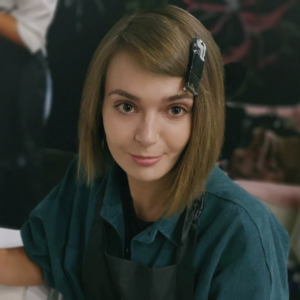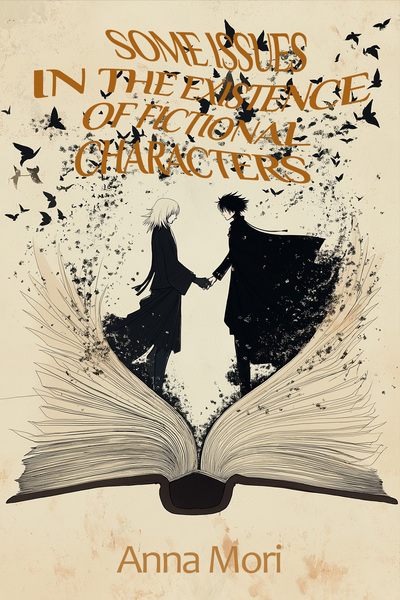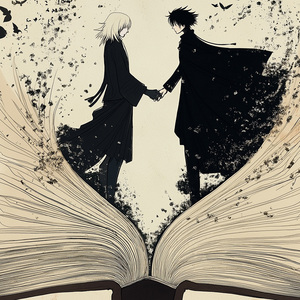At that moment, the boy in white saw that the same intricate script covered his own body — like an elaborate tattoo, or the interwoven stems of wild grass, or the darkened traces of tiny bruises.
"There is nothing real, and nothing has any meaning," the boy in black continued. "I have been dead for a long time. Or maybe I never existed at all. If you've decided that you're real — then that means I am not."
"Why must one of us be unreal?" The boy in white's voice was sharp with frustration. "If I were to tell you — yes, it's true, you're an illusion, I made you up — would that change anything? Would you feel any different? Would you want anything else? Think about it and decide: what would actually change once you heard the answer?"
"That depends on what the answer is."
"Nonsense," the boy in the tree snapped. "Believe me, you're just as human as I am. Even if I were to accept that nothing exists outside of my own mind, that would only mean my mind is far vaster than the part of it I call my memory, my imagination, my knowledge, my personality — in short, my 'self.'" His wrists ached like a failed suicide's, but at least his chest no longer hurt. The leaves were gone, and he could breathe, could speak again. And he suddenly remembered that, in his past life, he had been good at conversations like this — he never let himself be led astray. "And if this mind is vast enough to surprise me, to teach me new things, to contradict my own beliefs, how is it any different from the universe itself? Do you see now? There's no point in replacing the familiar idea of realism with this rotten solipsism, born out of loneliness. You say, 'Nothing exists.' I say — everything does. And so do you. Look — I no longer doubt you. And you shouldn't doubt yourself either. Do you want to be real? Then be real. You’re alive. If you cut your skin, you’ll bleed just like I would. Go on — cut yourself."
The boy in black frowned, as if wanting to argue — but obediently, he took the bone he had been using to carve at the tree and pressed it under his collarbone. Bright red blood welled up — jarringly vivid against the pale autumn landscape.
"It hurts," he murmured, almost in surprise.
"You see?" The boy in white's voice was firm. "You're real. You're human. You have blood. You feel pain, just like I do."
And then — suddenly, inexplicably — he remembered the black-clad boy’s name, and he was astonished. How could he have forgotten? There was no name in the world simpler than his.
"...And stop trying to argue philosophy with me, you’re terrible at it," he added, not condescendingly, but warmly. "You don’t need to be good at it. I love you because you’re not like me. You are proof that there is something in the world besides myself. You save me from loneliness. Just be yourself. You're good the way you are."
"And what am I?" The boy in black's voice was barely above a whisper, as if he feared the sound of it. "What do you know about me?"
"Why do you ask? I should be the question, and you — the answer."
"I'm asking because I don't know. I don't know if I'm real."
His eyes were the night sky with no stars, no moon — two wells of darkness that reflected nothing. But at their depths, the boy in white saw something: a quiet, wordless hope, as solemn and pure as a prayer.
For a long time, he gazed at him in silence, broken only by the creak of trees swaying in the autumn wind.
"I don't know very much," the boy in white admitted at last. But still, he began to speak, and his voice was soft, like the whisper of summer grass beneath bare feet. "You have the sharpest mind of anyone I know, though you’ve probably never read a single book in your life. I used to get angry at you, because you always kept yourself apart, like there was some invisible glass between you and the world — but now I see that you need a friend just as much as I do. You always do only what you want to do (just like me). You hate losing (just like me). You are kinder than I am, but more ruthless. You are an excellent liar, though you often look as trusting as a child..."
"Lying is a vital survival skill," his companion observed.
"I never said it wasn’t. And more — you drink green tea with milk and sugar. Sometimes, when you smile, you look sad. When you smirk, you look cunning. But most often, you just look as if everyone around you is an idiot..."
"You think that's enough to make someone real?" The boy in black's voice was serious.
"...You're a terrible neighbor," the boy in white continued. "The dark circles under your eyes look like smudged eyeliner. Your favorite color is blue. You're one centimeter shorter than me… if you bother to stand up straight. You have a cluster of freckles on your right shoulder blade that looks like a constellation. And the thing you fear most in the world is—"
"That's enough," the other boy laughed. "Sounds like you know me pretty well."
"...You have an unnatural love for sweets. But if one day you stopped liking them, you wouldn't stop being yourself."
"Wouldn’t I? But isn’t it all these things that make me who I am? What if I started getting enough sleep and got rid of my dark circles? What if I became a girl — would I still be me, or would I be someone else? Or what if—" he hesitated, horrified, "what if I became a redhead?!"
The boy in white couldn’t hold back a smile.
"I can’t quite picture it now," he admitted. "But someday — why not? We can change. That’s the nature of all living things. We grow, we take in new things. The more we learn, the more we discover who else we could become."
"You think I'd still be me if I stopped liking sweets?"
"Of course," the boy in white said easily. "You don’t have to love them forever. You yourself said we’re just illusions — if the world is made up by me. Or by you. You can be whoever you want."
"This is all too complicated," the boy in black grumbled. "You just finished convincing me I was real. But if the world is made up, doesn’t that mean nothing is real? How can everything be both real and invented at the same time? How can we be just words — and also have scent, and hands, and spit, and skin, and soft hair, and eyeballs, and living, beating hearts?"
"How can light be both waves and particles? How can Schrödinger’s cat be both alive and dead in the box? Whether you are real or not — you can decide. The same applies to everything else."
"Oh?" The boy in black tilted his head, suddenly looking like a thoughtful jackdaw. "Well then, if we get to decide whether the world is real or not, I don't see why you're still hanging there. Unless you like it, but that can't be true."
He dipped the tip of the bone into the blood still welling from his collarbone, and instead of carving into the tree, he used it like a stylus, tracing the outline of a human hand where the boy in white’s wrist was fused into the bark — clumsy, awkward, like the chalk outlines drawn around corpses at crime scenes.
"The tree isn’t real," he declared, as though commanding light to separate from darkness, land from sky. "But your hand is."
And suddenly — the boy in white had a hand. Not a human hand — a wooden one, rough with bark — but still, a hand, with fingers. He gasped in astonishment.
"Give me something to write with!"
"You mean draw with?"
"No. I mean write. There’s no magic stronger than words..."
The boy in black picked up a fallen, filthy feather and handed it to him. The boy in white clutched it clumsily in his wooden fingers.
"You know what this means?" he whispered. "We are omnipotent."
And he pressed the quill to his skin and wrote: FREE.
"See? Simple as that," said the boy in black, watching him with curiosity. "I came up with this, remember! Maybe I should write 'brilliant' on myself? Though I already am."
"You could write 'redhead.'"
"Not in a million years!"
They laughed. But then, all at once, the boy in white fell silent. And softly — hesitant, almost fearful, as if it wasn’t he who had just so confidently dismantled his companion’s lonely, hopeless philosophy — he asked:
"But… you’re really here? I’m not alone?"
The boy in black looked like he was about to say something. But in the end, he only nodded. And held out his hand.
"Shall we?"
They clasped hands and stepped into the library.











Comments (0)
See all